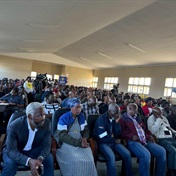
Section 59 hearing told how different medical schemes are profiling doctors based on race and ethnicity
There is a war raging between medical aids and healthcare practitioners – and patients have increasingly become the casualties.
This week, a section 59 investigation – into allegations that African and Indian doctors were being treated unfairly by medical schemes – heard that their claims were being withheld “arbitrarily” in many instances based on their ethnicity and the colour of their skin.
One submission after another told how these doctors were being railroaded by schemes through so-called forensic probes, had to sign acknowledgments of debt for huge amounts, were withheld payments of claims or, worse, blacklisted.
One practitioner, Dr Aslam Vallee, wept at the hearing as he told about his own “nightmare” encounter with a large medical scheme, dating back to 2002.
Ultimately, he was forced to sell his practice and now suffered from anxiety and depression.
But what about the effects on the people at the centre of it all, the patients?
Shafrudeen Amod, a medical law consultant and pharmacist, speaking on the sidelines of the hearing, told City Press about a case that had started in 2007 and was still ongoing.
He said it involved a woman who had a brain aneurysm – swelling of a blood vessel in the brain – and needed immediate surgery.
The patient was prepped and ready for surgery. Doctors knew she had to be stabilised before her condition deteriorated.
But, said Amod, when the hospital asked for authorisation of the surgery, the medical aid refused.
The issue had nothing to do with the woman. It was between the attending neurosurgeon and the medical aid scheme which had a billing issue with the surgeon.
The practitioner in question was an Indian neurosurgeon and his patient was also Indian.
“Because it was an emergency the couple had to pay R25 000 upfront to stabilise her, and R6 000 for an ambulance to transfer her to a different hospital. In total they had to pay about R140 000. And the medical aid scheme suspended the woman’s membership a day after she had the operation because she allegedly didn’t disclose she had suffered from headaches in the past,” Amod said.
This is just one of a growing volume of cases the National Health Care Professionals’ Association – which has 2 500 members, one of whom is Amod – was collating.
More cases were “coming through steadily” and had been submitted to the hearing’s panel confidentially to protect patients’ identities.
At the hearing Dr Donald Gumede, chairperson of the association, said healthcare practitioners were “inexplicably under siege” and “walking on eggshells” because of the prevailing climate of distrust and hostility from medical aid schemes.
“At the heart of the issue is the fight over money – patients’ money. That is the simplest way of putting it. All the disputes that will be placed before the investigating panel are, in the final analysis, reduced to a fight over financial interests,” he said.
Norman Mabasa, board member and former chair of the SA Medical Association (Sama), spoke anecdotally about how a black gynaecologist in Giyani, Limpopo, who performed Caesarean sections in 2003 at a time when they weren’t widely done, was probed by a big medical scheme for fraud – just because other doctors weren’t billing and doing the same procedure.
Doctor organisations, which made submissions at the hearings, charged that medical aid schemes and their administrators were abusing section 59 and acted as “prosecutors and judges” when investigating fraud, waste and abuse – investigations, they said, they had no legal mandate to carry out in the first place.
The Health Professions Council of SA – which has 187 000 registered practitioners – said its analytics data showed that although it had more African practitioners registered, it had received more complaints by its white registered practitioners.
But, they said, this could be because whites were more likely to complain because of their levels of education and affluence.
Earlier this year the Council for Medical Schemes convened a summit on fraud, waste and abuse in the industry, which is said to cost it between R22 billion and R25 billion a year.
At the summit private practitioners defended themselves against the commonly held narrative that it was doctors driving fraud and waste.
Instead they said it was the “medical aid schemes themselves that were acting as laws unto themselves through unlawful probing”.
Gumede said he had heard of schemes calling the spouses of medical practitioners and asking what time their partners got home from work.
They also questioned how practitioners could see as many as 30 patients a day.
Practitioners said it was “possible” and “most likely” that medical schemes, which were investigating fraud and abuse, used racial profiling to discriminate against black doctors – even though the schemes denied this and said they used practice numbers, which were anonymous.
Elijah Nkosi – chief executive of the Independent Practitioners’ Association Foundation – representing 5 000 doctors – said that although it might be hard to prove these allegations, one had only to look at the demographics and geographical bases of the practices “targeted” for the “forensic probes” to see that they were in “historically black population-based areas”.
The council was criticised this week by various doctor organisations for in effect being “toothless” and “aiding and abetting medical schemes” in abusing the law.
The panel, led by Advocate Tembeka Ngcukaitobi SC, will make recommendations to the Council for Medical Schemes to address the complaints and on the appropriate administrative, legal and policy interventions.
TALK TO US
Have you been caught in the war between health carers and medical aid schemes?
SMS us on 35697 using the keyword MEDICAL and tell us what you think. Please include your name and province. SMSes cost R1.50. By participating, you agree to receive occasional marketing material
 |
| ||||||||||||
| |||||||||||||




 Publications
Publications
 Partners
Partners








